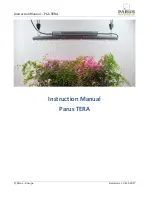
NOTICE
The test phantom can be damaged if
it is dropped.
❯
Secure the test phantom so that it
cannot fall down.
❯
Alternatively, place the test phantom
on a level surface and insert the tube
vertically into the centering rings of the
test phantom.
❯
Turn the tube upwards and place the test
phantom with the centering rings on the tube.
If the test phantom does not fit on the
tube, with many manufacturers it is possi-
ble to order a tube of the correct size
separately.
❯
Adjust the X-ray parameters (kV, mA, s) on the
X-ray unit (use the maxillary molar settings, see
"14 Recommended exposure times") and trig-
ger an X-ray image acquisition.
Analysis
1
2
3
1
Useful radiation field
2
Low contrast
3
High contrast
❯
Draw a measuring line from the center point of
the test image to the edge (boundary between
dark/light contrast). The measured result must
be less than 30 mm.
The diameter of the useful radiation field (field
size at the end of the tube) must not exceed
60 mm.
In VisionX Inspect the useful radiation field
can be measured with the measuring
function in the tool box. (Refer also to the
VisionX handbook).
❯
The four holes (low contrast) must be identifia-
ble.
❯
At 5.0 LP/mm, the diagonal lines must be
clearly distinguishable from each other (high
contrast).
Electrical safety checks
❯
Carry out the electrical safety check according
to national law (e. g. in accordance with IEC
62353).
❯
Document the results.
❯
Carry out and document the instruction and
handover for the unit.
A sample handover report is included in
the attachment.
Installation
2121100020L29 2101V007
23
EN-
US
















































